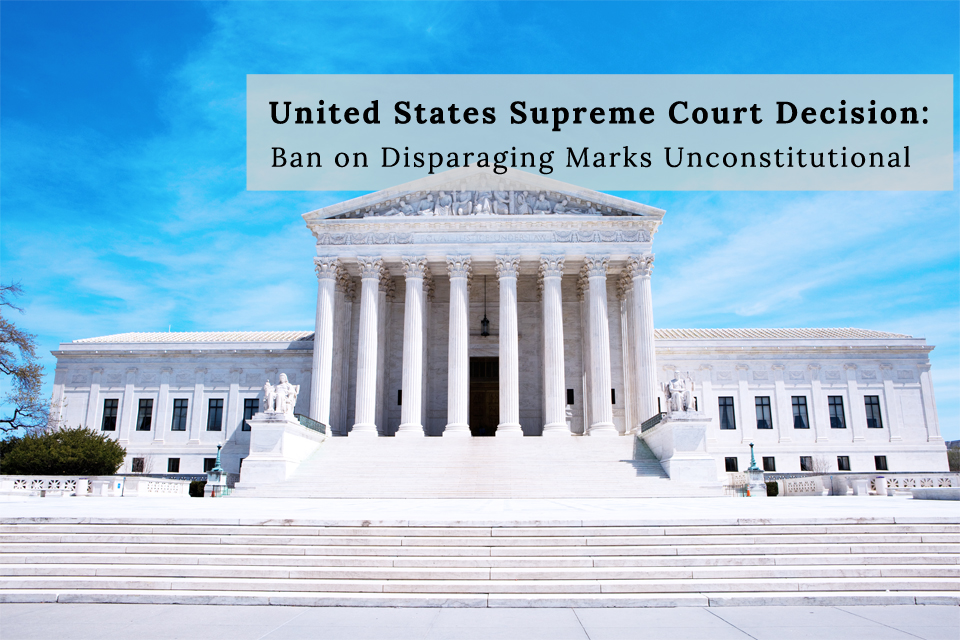Supreme Court: Ban on Disparaging Trademarks is Unconstitutional

In a decision that will have a huge impact on the United States trademark system, the Supreme Court held that the federal law (the Lanham Act) which allows the USPTO to refuse to register “disparaging” trademarks violated the First Amendment and was unconstitutional.
Simon Tam, the front man for the Asian-American rock band “The Slants” filed a trademark application with the United States Patent and Trademark Office and was denied because the mark was considered “disparaging.” Section 2(a) of the Lanham Act, the so-called “disparagement clause,” prevents the registration of a trademark with the U.S. Government that “may disparage . . . persons, living or dead, institutions, beliefs, or national symbols, or bring them into contempt or disrepute.” The USPTO reasoned that Tam’s trademark, “THE SLANTS,” disparaged those of Asian heritage (even though Tam and his band are all Asian-American.) Simon Tam appealed the decision and, eventually, the case went all the way to the Supreme Court.
Is trademark registration a form a “private speech” protected under the First Amendment?
The Supreme Court held that trademarks are considered a form of “private speech” and by restricting trademark registration based on the “viewpoint” of the trademark, that it violated the First Amendment. The Court held that the disparagement clause “offends a bedrock First Amendment principle: Speech may not be banned on the ground that it expresses ideas that offend.”
It also rejected the government’s argument that trademark registration was “government speech” or should otherwise not have the same level of protection that “private speech” has under the First Amendment. The Court colorfully rejected this argument, arguing that trademark registrations are not a form of government speech, “especially given the fact that if trademarks become government speech when they are registered, the Federal Government is babbling prodigiously and incoherently” because of the wide array of different trademarks registered each year.
Why is a trademark registration important?
This case, at its heart, was about whether the United States government can reject trademark registrations on the basis of the potentially disparaging content of a trademark. The Supreme Court found that a trademark registration gives the owner a number of powerful rights, including a presumption of ownership, nationwide notice, and a presumption of validity. It also allows the trademark registrant to register with the U.S. Customs and Border Patrol database and have counterfeit goods seized during inspection. Without a doubt, a trademark registration is valuable.
What does this mean?
The Supreme Court’s decision means that the USPTO can no longer refuse a trademark on the grounds that it is “derogatory” towards a particular group. This is especially important to the Washington, D.C. football team, the Redskins, who have been in a multi-year dispute with a group of Native-American activists over whether the Redskins trademarks are disparaging to Native-Americans. This will render the case moot and reinstate the Redskins trademarks. It will also open the door for many more marks that may be disparaging.
While it remains unclear, it likely means that the USPTO will also allow the registration of “offensive” or “immoral” trademarks, such as marks containing curse words and adult images. This would also allow applicants to register a wide variety of words and phrases that were previously banned.
The Supreme Court’s decision will have widespread effects on trademarks and on trademark law. Now, businesses will be more likely to invest in edgier, adult-themed trademarks that they otherwise would not have been able to register with the U.S. government. If you have rejected in the past for having a “disparaging” trademark or if you have an edgy, potentially adult trademark that you want to register, you should talk to a trademark attorney today and discuss plans to be on the front lines of a new wave of trademarks.
Do you need assistance with a trademark matter?
Contact an Attorney Today